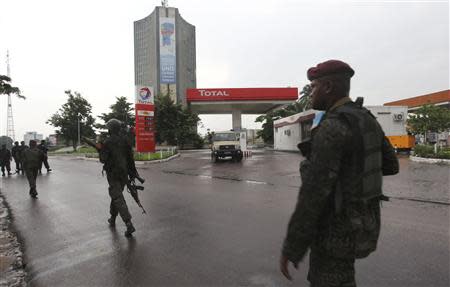Congo's army repels attacks in Kinshasa, dozens killed
By Bienvenu Bakumanya KINSHASA (Reuters) - Congolese troops killed dozens of armed youths who attacked the airport, a military barracks and state television headquarters in the capital Kinshasa on Monday in incidents claimed by a disgruntled religious leader. Before transmission was shut down at state television, the attackers shouted slogans in favor of pastor Paul Joseph Mukungubila and against President Joseph Kabila. The pastor, who calls himself a prophet and once ran for president in 2006, later told the BBC that the attacks were in response to government harassment of his supporters. "It's the fifth time the brothers were attacked; they decided to show what they are capable of," he said late on Monday. Several corpses lay on the rain-soaked ground outside the brightly painted gates of the state television center after the attack, a Reuters witness said. The broadcaster reported that security forces had killed 46 of the attackers, while government officials said about 20 more had been arrested. Shortly after the clashes, soldiers in the eastern mining province of Katanga attacked a church run by Mukungubila, who has railed against Kabila's decision to make peace with Tutsi rebels in eastern Congo, saying the president was under the influence of Rwanda. Witnesses said the fighting in the regional capital Lubumbashi quickly subsided. Security forces found arms and ammunition in the church, sources told Reuters. "We have total control of the situation," said government spokesman Lambert Mende, saying there were no civilian or troop casualties. Government officials said the Kinshasa assault was carried out by untrained youths in civilian clothes with aged military equipment and appeared to be more a political statement than an attempt to seize power in the riverside city of more than 9 million people. Some analysts in Kinshasa said the attacks could be linked to Kabila's recent decision to replace national police chief John Numbi, a powerful political figure from Katanga, with Charles Bisengimana, an ethnic Tutsi. Democratic Republic of Congo is struggling to emerge from decades of violence and instability, particularly in its east, in which millions of people have died, mostly from hunger and disease. A 21,000-strong United Nations peacekeeping mission (MONUSCO) is stationed in the country. HOSTAGES Gunmen briefly seized the headquarters of state radio and television in Kinshasa just before 0700 GMT (0800 a.m. local), taking several journalists hostage. Witnesses also reported shooting at the Tshatshi military camp, close to the Defence Ministry, and at the international airport. A local MONUSCO staff member was wounded during shooting at the airport but was in a stable condition, a U.N. spokesman said. Some flights were diverted to Brazzaville, the capital of Congo Republic, on the other side of the Congo river. "Gedeon Mukungubila has come to free you from the slavery of the Rwandan," shouted one youth in the Lingala language on television, while two panicked presenters stared at the camera. A voice off-camera could be heard to say in Lingala: "Kabila, it's finished for him from today." Kabila has ruled the vast, mineral-rich African nation since 2001 following the assassination of his father, Laurent. Opponents of Kabila, who was educated in Tanzania and Uganda, accuse him of being a Rwandan in an attempt to tarnish his reputation. Mukungubila, nicknamed Gedeon by his followers, made a failed bid for the presidency against Kabila in 2006. In the Maniema province of eastern Congo, Mai Mai rebels briefly seized the airport in the town of Kindu before they were dislodged by U.N. and government forces. It was not clear if this was related to events in Kinshasa and Lubumbashi. In the capital, streets emptied and shopkeepers closed their shutters as the attack sowed panic among the population. The areas around the barracks and television HQ were cordoned off and riot police patrolled the streets in Jeeps. "With their adventures, Kabila and the others are ignoring our suffering. We have had enough," said Betty, a banana saleswoman on Boulevard 30 Juin in central Kinshasa. Political tension has risen amid speculation that Kabila may try to change the constitution and run for a third term in 2016 against a fragmented opposition. The defeat of M23, Congo's most important rebel group, strengthened his grip on power. (Additional reporting by Kenny Katombe a Goma; Writing by Daniel Flynn and Emma Farge; Editing by Cynthia Osterman)


